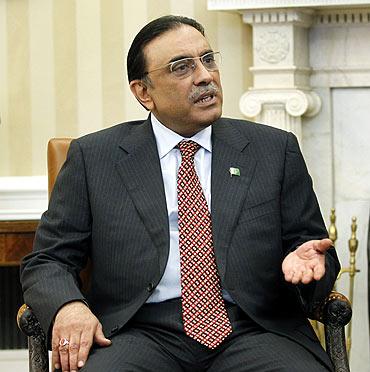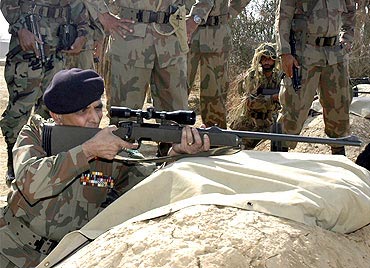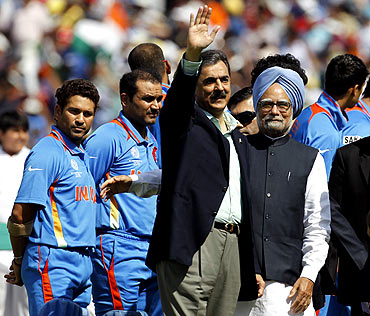
Pakistan President Asif Ali Zardari has accused the army, which covertly supports the 2008 Mumbai attacks perpetrator Lashkar-e-Tayiba, of playing a double game in the ongoing war on terror, and an "abundance of evidence backs him up," Bruce Riedel, a former Central Intelligence Agency officer, has said.
"The Pakistani Army and the Inter-Services Intelligence cannot be relied upon to fight all of the jihadi Frankensteins they have helped create over the past three decades. Even Pakistan's own president, Asif Ali Zardari, has accused the Army of playing both sides of the war on terror distressingly, an abundance of evidence backs him up," Riedel, the author of Deadly Embrace: Pakistan, America, and the Future of the Global Jihad, wrote in Newsweek.
"Take LeT, the terror group that attacked the Indian financial capital of Mumbai in 2008, killing 164 people. Today, LeT continues to enjoy Army patronage. Pasha, the intelligence chief, has even been summoned by a New York City court to answer charges that the ISI oversaw the Mumbai attack," he added.
...

Riedel noted that although Pakistan is also a victim of terror, since thousands of Pakistanis have died in suicide bombings, and the country has more troops deployed fighting jihadi militants on the Afghan border than the North Atlantic Treaty Organisation has in all of Afghanistan, its contradictory behaviour is the root cause of its tense relations with the United States.
"The Pakistani Army -- which unquestionably remains the power behind the throne -- has grown increasingly restive and angry with American intelligence work over the past two years," he said.
"The complexity and contradictions of Pakistani behaviour, most of which is driven by the Army's obsession with India, actually, lies at the heart of the dispute between Islamabad and Washington. There is no simple solution," stated Riedel, who is a senior fellow in the Saban Center at the Brookings Institution.
...
He was of the view that if the US-Pakistan alliance further goes south, only Al Qaeda will emerge as the real winner, and US President Barack Obama's goal to "disrupt, dismantle, and defeat Al Qaeda" will become an ever-more distant possibility -- if the drone operations slow and the two intelligence agencies -- US' CIA and Pakistan's ISI clam up.
Since Pakistan today has the fastest-growing nuclear arsenal in the world, Islamabad is growing more and more resistant to outside pressure and intimidation, and Pakistan Army chief General Ashfaq Parvez Kayani is well aware that unlike Afghanistan, Iraq, or Libya, the US cannot even consider the use of force to pressure Pakistan, said Riedel, pointing out that the country also controls the main supply line for NATO forces from Karachi to Kabul in Afghanistan.
"So at the end of the day, Washington knows it needs Pakistan, no matter how frustrating and irritating the relationship may be. Meanwhile, India, the target of most of the worst of Pakistani-abetted terror and the target for its nuclear weapons, finds itself in much the same dilemma," Riedel said.
...

He noted that while India demands that Pakistan destroy LeT and other militant groups, it has no means to force nuclear-armed Islamabad to do so.
"It doesn't want a failed state on its border armed with dozens of loose nukes, so it can't undermine Pakistan's fragile democracy with covert operations that would only strengthen the extremists. It can't intimidate a nuclear rival. So India last month resumed its engagement and dialogue with Pakistan, which had been suspended after the Mumbai attacks," he added.